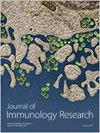β-Glucan Subverts the Function of Myeloid Cells in Neonates
IF 3.6
3区 医学
Q2 IMMUNOLOGY
引用次数: 0
Abstract
β-Glucan is the main component of the cell wall of pathogen-associated molecular patterns (PAMPs) including various yeast, fungi, or certain bacteria. Previous reports demonstrated that β-glucan was widely investigated as a potent immunomodulators to stimulate innate and adaptive immune responses, which indicated that it could be recommended as an effective adjuvant in immunotherapy. However, the detailed effects of β-glucan on neonatal immunity are still largely unknown. Here, we found that β-glucan did not affect the frequencies and numbers of myeloid cells in the spleen and bone marrow from neonates. Functional assay revealed that β-glucan from neonates compromised the immunosuppressive function of immature myeloid cells, which were myeloid-derived suppressor cells (MDSCs). Flow cytometry or gene expression analysis revealed that β-glucan-derived polymorphonuclear (PMN)-MDSCs produced lower level of reactive oxygen species (ROS) and arginase-1 (Arg1) in neonatal mice. Furthermore, β-glucan administration significantly decreased the frequency and ROS level of PMN-MDSCs in vitro. These observations suggest that β-glucan facilitates the maturation of myeloid cells in early life, which may contribute to its beneficial effects against immune disorders later in life.β-葡聚糖颠覆新生儿髓系细胞的功能
β-葡聚糖是病原体相关分子模式(PAMPs)细胞壁的主要成分,包括各种酵母、真菌或某些细菌。以前的报道表明,β-葡聚糖作为一种强效免疫调节剂,可刺激先天性和适应性免疫反应,这表明它可被推荐作为免疫疗法的有效佐剂,这一点已得到广泛研究。然而,β-葡聚糖对新生儿免疫的具体影响仍是一个未知数。在这里,我们发现β-葡聚糖不会影响新生儿脾脏和骨髓中髓系细胞的频率和数量。功能测试显示,新生儿体内的β-葡聚糖损害了未成熟髓系细胞(即髓源抑制细胞(MDSCs))的免疫抑制功能。流式细胞术或基因表达分析表明,β-葡聚糖衍生的多形核(PMN)-MDSCs 在新生小鼠体内产生的活性氧(ROS)和精氨酸酶-1(Arg1)水平较低。此外,服用β-葡聚糖可显著降低体外多形核-MDSCs的频率和ROS水平。这些观察结果表明,β-葡聚糖能促进髓系细胞在生命早期的成熟,这可能有助于其对生命后期的免疫紊乱产生有益影响。
本文章由计算机程序翻译,如有差异,请以英文原文为准。
求助全文
约1分钟内获得全文
求助全文
来源期刊

Journal of Immunology Research
IMMUNOLOGY-
CiteScore
6.90
自引率
2.40%
发文量
423
审稿时长
15 weeks
期刊介绍:
Journal of Immunology Research is a peer-reviewed, Open Access journal that provides a platform for scientists and clinicians working in different areas of immunology and therapy. The journal publishes research articles, review articles, as well as clinical studies related to classical immunology, molecular immunology, clinical immunology, cancer immunology, transplantation immunology, immune pathology, immunodeficiency, autoimmune diseases, immune disorders, and immunotherapy.
 求助内容:
求助内容: 应助结果提醒方式:
应助结果提醒方式:


